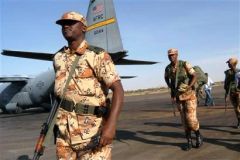African Union under test in Sudan’s Darfur crisis
By Lin Xiaochu, Dai Adi
LAGOS, Dec 28, 2004 (Xinhua) — The African Union, the 53-member bloc of the impoverished continent bugged by violence and conflict for decades, is struggling to find an African solution to the crisis in Sudan’s troubled Darfur region.

|
|
Rwandan soldiers arrive on a U.S. Air Force C-130 cargo plane at El Fasher airport in Darfur, October 30, 2004. |
The African Union is trying to demonstrate that Africans can solve their own problems and prove itself to be an effective regional body that can be counted on.
But what has happened during the past year, especially the collapse of the latest round of talks between rebels from Darfur and Khartoum in Nigerian capital Abuja on Dec. 21, shows how difficult it is to end the Darfur crisis, and puts the toughest test ahead of the bloc.
The African Union at first brought the Sudanese government and the rebel groups, the Justice and Equality Movement and the Sudanese Liberation Army/Movement, together in April in Chadian capital N’djamena, successfully pressing them to agree on a ceasefire, which was strengthened in November with the two sides signing another two protocols on security and humanitarian aid in Abuja.
Under the bloc’s auspices, Khartoum and the rebel groups also held several rounds of peace talks in Ethiopian capital Addis Ababa and Abuja separately, but all ended without breakthrough, asboth sides accusing each other of violating the ceasefire agreement and protocols.
The situation puts the African Union, especially its troops stationed in the region in western Sudan in apparent jeopardy.
Last Thursday, Khalil Ibrahim, the leader of the Justice and Equality Movement (JEM), told reporters it would only accept the United Nations as principal mediator in any peace talks and wanted UN troops stationed in Darfur. The other rebel group, the Sudan Liberation Army/Movement (SLA/M), said it was also very unhappy with the African Union.
Meanwhile, UN Secretary General Kofi Annan commented: “Our approach is not working … the situation (in Darfur) is deteriorating … the African Union has not been able to put in as many forces as we had hoped.”
Around 900 African Union troops are on ground in Darfur, although more than 3,000 have been pledged. They are authorized to determine whether or not the government and the rebel groups are abiding by the ceasefire, but cannot arrest anyone or intervene in the fighting in any way.
Critics call for speedy troops deployment with a stronger mandate so that they can better protect civilians and play a bigger role in stopping the conflict.
“This mandate and protection are needed now, more than ever, as the fighting and civilian deaths continue to climb,” said the Human Rights Watch, a US-based human rights group, in a letter to Nigerian President Olusegun Obasanjo, who heads the African Union.
But even if this happens, problems remain. One of them is the force’s size, as covering a region the size of France by 3,000 troops without enough military vehicles or helicopters would be a joke. In contrast, 15,000 UN peacekeepers patrol the much smaller,once equally chaotic, Liberia in west Africa.
Things became more complicated when the United States imposed an asset freeze on senior Sudanese officials and called for a travel ban for those officials last Thursday. Media reports said on Sunday that British Prime Minister Tony Blair had ordered military chiefs to prepare to deploy up to 3,000 troops to Darfur.
In the face of such pressure from the West, the African Union troops and Khartoum have to be more swift to show its resolves in settling the Darfur crisis.
The world is eyeing the pan-African body, which is making efforts to bring back Khartoum and the two rebel groups to the negotiating table in Abuja in January, as the African Union hopes to pass its first real test to peace and security on the continent.
“If the African Union fails, the Darfur people will suffer, theworld will also suffer,” noted Nigerian President Obasanjo on his recent US trip.
Darfur has been embroiled in conflict since February 2003 when the rebel groups took up arms against Khartoum, demanding autonomy.
The conflict has so far caused thousands of deaths and sent over a million fleeing to neighboring Chad or internally displaced.
